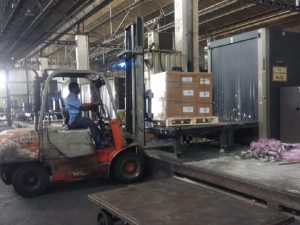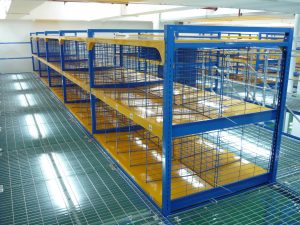Reacting to the news of freighter operations getting shifted to the Navi Mumbai Airport, Kamal Jain, Director, Cargomen Logistics said, “With CSMIA suspending freighter operations from August 16, 2025, Navi Mumbai International Airport (NMIA) is preparing to handle the cargo shift. While processes are digital, cargo movement remains physical, requiring careful planning and adaptation. Initial hiccups are expected due to the new setup, unfamiliar teams, and evolving processes. Freight forwarders are concerned about additional costs, including staff commuting expenses. The freight forwarding and logistics industry remains cautiously optimistic but is preparing for early disruptions, higher logistics costs, and operational challenges. Despite short-term difficulties, the air cargo community believes NMIA will strengthen Mumbai’s future as a major cargo hub.”
Read More »‘APAC is the inflection point, timing of FIATA meet is great’
Ahead of upcoming FIATA RAP Meet in New Delhi from May 21- 24, being jointly organised by FIATA and ACAAI, J Krishnan, Board of Advisor, ACAAI said “The dynamics of world trade is facing a tectonic shift. APAC is the inflection point and the timing of this event in India cannot be at a more opportune moment. Exchanging new avenues to ensure the adverse effects of shifting trade imbalances amongst the key supply chain managers of this region is a “God send” for renewing and readjusting the existing partnerships and forging new alliances for the Indian supply chain. It is the logistics service providers of the 21st century who proactively interact with the export and import trade offering cost-effective-solutions and alternate routing. Today’s India is a serious player in world trade arena.”
Read More »‘Efficient cargo handling, streamlined customs clearance, and strong road connectivity will be essential’
Rajen Bhatia, MD, Tulsidas Khimji said, “With Chhatrapati Shivaji Maharaj International Airport (CSMIA) temporarily suspending freighter operations due to ongoing infrastructure upgrades, the spotlight now shifts to Navi Mumbai International Airport (NMIA). The pressing question: Is NMIA prepared to take on the cargo baton? This transition is more than a simple logistical rerouting—it is a live stress test of NMIA’s readiness to manage large-scale freighter operations. While the airport is being developed with world-class infrastructure, it has yet to demonstrate its capabilities under real-time operating conditions. Critical elements like efficient cargo handling, streamlined customs clearance, and strong road connectivity will be essential to maintain business continuity during this period. To complicate matters, the decision to shift operations by mid-August 2025 appears to have been made without full stakeholder consultation. This abrupt timeline risks disrupting the smooth flow of cargo and may leave many stakeholders underprepared. Current Readiness and Gaps CSMIA currently handles four to five freighter flights daily. Although NMIA’s runway and taxiways are reportedly ready, the cargo-specific infrastructure is still under development. For NMIA to function as a viable cargo hub, the following must be fully operational: Dedicated areas for cargo handling, storage, and processing Specialized zones for hazardous and perishable goods Customs clearance including customs office / staff and inspection facilities Office space for cargo agents, freight forwarders, customs brokers Key Concerns and Potential Disruptions The logistics industry is preparing for a series of short-term challenges that may arise from this sudden transition: Transit Delays: Unfamiliarity with new routes and procedures could result in delayed shipments Higher Logistics Costs: Longer lead times and last-mile delivery changes may increase operational expenses Teething Issues: Handlers, transporters, and support staff will need time to adapt to the new …
Read More »‘Making the shift to NMIA a timely and much-needed welcome change’
Debajyoti Bagchi, Vice President – Business Development, TT Group said, “While the transition of freighter operation from CSMIA to NMIA may bring initial teething issues effective from Aug 16, 2025, it is typical with any major operational shift and such challenges are expected to stabilise over time. Change is inevitable, but adapting to it requires time and collaboration. A similar experience was observed during the transition of airports in cities like Bengaluru and Hyderabad. The shift from HAL to Kempegowda International Airport in Bengaluru and from Begumpet to Rajiv Gandhi International Airport in Shamshabad, initially posed challenges. However, those decisions have proven to be transformative, ushering in world-class airport & cargo infrastructure and garnering international recognition, including multiple Skytrax awards. For decades, Mumbai’s air cargo operations have grappled with infrastructure constraints, even as cargo stakeholders experienced exponential grown. This growth has been managed within the same limited space, making the shift to NMIA a timely and much-needed welcome change. The new integrated cargo terminal is expected to significantly improve cargo handling efficiency while targeting 3.25 million metric tons during its final phase, including seven code F stands, automation, dedicated ODC corridor resulting faster acceptance, ample equipment to do build-up, and dispatch processes to apron side. Moreover, NMIA’s strategic location, with direct connectivity to major highways, eliminates the need for cargo trucks to enter the city and deal with ‘no-entry’ restrictions—resulting in smoother, more predictable logistics with faster handover timing. It is imperative for NMIA to focus and get all statutory & regulatory validations done such as EU-RA3, TSA, ACC3, GSDP-WHO, ISAGO including EDI to make the ball rolling faster before the official inauguration. While customers and stakeholders will take time …
Read More »‘NMIA must conduct trial run of freighters to identify bottlenecks’
Sunil Kohli, Managing Director, Rahat Cargo said, “As per reports, NMIA proposes to implement a state-of-the-art Cargo Management System with real time tracking, transparency and automated truck slot management process to avoid congestion and to further reduce dwell time for vehicles apart from introducing paperless transactions. These moves undoubtedly are welcome steps to facilitate cargo movement from to-be-commissioned NMIA. However, as per trade whispers, the infrastructural facilities there are yet to get fully operational and hence there remain apprehensions among the trade whether seamless functions relating to freighter operations effective August 16 2025 would actually be possible. It would have been desirable to conduct a trial run of the freighters well before to identify the emerging bottlenecks with a view to have their corrections before the effective date of full-fledged freight operations.
Read More »‘NMIA must ensure dedicated cargo facilities for efficient handling & processing’
Vipin Vohra, Chairman, Continental Carriers said, “With freighter operations shifting to NMIA during CSMIA’s upgrade, a smooth transition is critical. While NMIA offers modern infrastructure, it must ensure dedicated facilities for forwarders—currently concentrated around CSMIA—for efficient handling and processing. Proximity to cargo terminals is vital for seamless movement. Forwarders are preparing for the shift, but coordinated efforts and infrastructure support near NMIA are essential to minimize disruption and unlock long-term gains for Mumbai’s air cargo ecosystem.”
Read More »‘Improve road infrastructure to facilitate efficient cargo movement at NMIA’
M Afzal Malbarwala, Managing Director, Galaxy Freight shared, “We are excited about the new Air Cargo Complex (ACC) in Navi Mumbai International Airport (NMIA). It’s a big step forward for the freight forwarding industry. But we really need better infrastructure to make the most of it. The road to the NMIA needs to be improved so that cargo can get there in under an hour. This isn’t just a nice-to-have; it’s absolutely necessary. We need to clear up some questions about the cargo cleared at the old ACC. Will it be bonded and transported by airlines? If so, are there going to be extra charges for that? If they add these costs to the freight without being upfront, it could create unexpected expenses for everyone involved. Plus, if we use bonded trucking from the old ACC and only some of the cargo from an Air Waybill (AWB) gets shipped, what happens to the rest? Will it be loaded onto the plane or put on hold until the balance is ready? If the next flight doesn’t leave for a few days, who pays for the extra storage fees? Also, what’s the plan for screening the cargo? Is it going to be done at both complexes? If we pay Terminal Charges (TC) at the ACC where the cargo is cleared, will there be more charges for screening at the new ACC? Since there’s a brand-new ACC, it would be great if there were spaces for agents to create their pallets, just like in many other countries. If we can tackle these issues and get the right infrastructure in place, it will make everything run much smoother.
Read More »Navi Mumbai Int’l Airport to commence freighter ops from Aug 16, 2025
Navi Mumbai International Airport (NMIA) is nearing completion of its state-of-the-art cargo terminal and gearing up for inauguration and operation by August 16, 2025. As per an official statement, NMIA will have dedicated integrated cargo terminal (for both domestic and international) with handling capacity of 0.5 milion tonnes per annum in phase 1 and 2 and will be further scaled up to 3.25 million metric tonnes post completion of final phase. As of now, Adani Group has also announced infrastructure upgradation at Mumbai’s Chhatrapati Shivaji Maharaj International Airport. CSMIA will temporarily shut down a part of its cargo facilities and not have freighter operations from August 16, 2025, ‘until further notice’, as per the official statement. Private and charter planes operating to and from CSMIA will be moved to Navi Mumbai too. Mumbai International Airport Ltd (MIAL) has informed operators it is doing so to carry out multiple airside works including building new taxiways for Runway 14/32 to enhance its capacity and bring efficiency in operations. The Navi Mumbai Airport will be inaugurated this June and it may become operational before the Aug 16 deadline for freighter movement at CSMIA, said reports.
Read More Ȃelebi deploys Taxibots at BLR & DEL to boost sustainability
Çelebi Aviation has successfully deployed Taxibots across Bengaluru and Delhi. Taxibots are towbarless aircraft tractors that are fully automated. Unlike traditional methods, where aircraft engines are used to taxi from the gate to the runway, these TaxiBots provide an eco-friendly alternative by towing the aircraft without the need to use the aircraft’s own engines. These state-of-the-art, semi-robotic aircraft towing systems have led to a reduction of over 1,137 tons of aviation fuel (ATF) consumption, eliminating more than 3,500 tons of CO₂ emissions while saving over 427 hours of ground time for airlines and also saving 1429 hours of engine time for aircrafts, which translates into significant financial benefits and sustainable solutions for airline partners. As part of its electrification roadmap, Çelebi is the First ground handling company in India to proactively invest in Taxibot technology, and globally these were first operated on commercial operations in India. The company has currently deployed Taxibot units at Delhi’s Indira Gandhi International Airport (DIAL) and at Bengaluru’s Kempegowda International Airport (BIAL). This initiative directly aligns with global aviation’s carbon neutrality goals and India’s sustainability vision. Additionally, Çelebi Aviation has ensured operational excellence by training 3,592 certified Taxibot crew members, positioning itself as a future-ready ground handling partner. With airlines increasingly prioritizing green solutions, Çelebi’s Taxibot deployment is set to further revolutionize aircraft movement efficiency at major Indian airports.
Read More »Crown Worldwide unveils custom bonded warehousing service in India
Crown Worldwide Group has introduced its new custom bonded warehousing service in India, operated under its Crown Workspace & Warehousing division. The new service is designed to provide businesses with a duty-free, secure, compliant and technology-enabled solution for storing high-value imported goods without the immediate payment of customs duty. This strategic initiative aims to streamline import-export operations, ensure superior logistics services and provide global businesses greater agility in managing their supply chains. The bonded warehouse is now operational in Mumbai. It offers ISO-certified, digitally managed, and tamper-proof, dust-free storage designed to handle a wide range of high-value products—including fine wines and spirits, luxury goods and fashion, jewelry, electronics, and general cargo. The facility also supports ESD-safe handling for sensitive electronic items and includes flexible options for bulk and industrial goods. In terms of security, the warehouse is equipped with 24/7 surveillance, restricted access protocols, and full insurance coverage against theft or damage. It is built to meet international standards for safety and operational efficiency, ensuring clients have complete peace of mind. Kavitha Suresh, Assistant General Manager, Workspace and Warehousing- Crown Worldwide Group spoke about this latest venture, “At Crown, we have always looked to push boundaries. The custom-bonded warehousing service integrates technology to provide our clients with a seamless storage and transit experience. Through this new development, we are effectively bridging global benchmarks with local needs. From luxury items to bulk to electrical, electronics, and imported wine & spirits we look forward to catering to all sectors and offering a great experience to our clients.”
Read More » Cargo Breaking News
Cargo Breaking News









